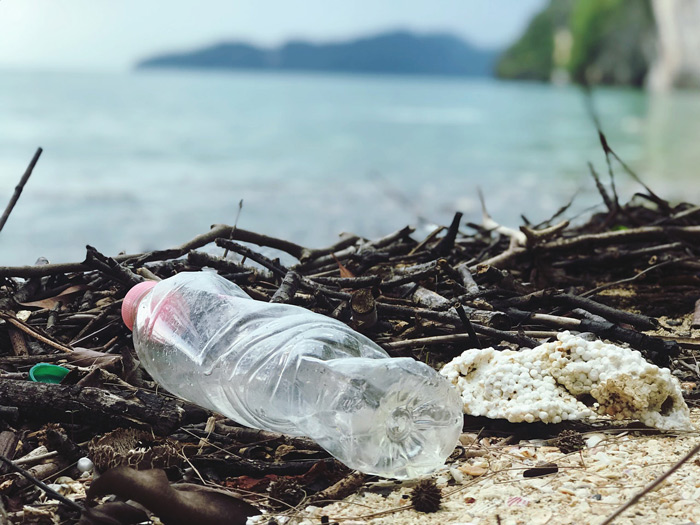报告:美国是全球塑料垃圾最大来源国 'Deluge of plastic waste’: US is world’s biggest plastic polluter
中国日报网 2021-12-08 15:39

日前提交给美国联邦政府的一份新报告显示,美国人口虽只占全球的4.3%,但美国却是全球塑料垃圾的最大来源国,每年制造的塑料垃圾总量比整个欧盟的总和还要多。

The US is the world’s biggest culprit in generating plastic waste and the country urgently needs a new strategy to curb the vast amount of plastic that ends up in the oceans, a new report submitted to the federal government has found.
一份提交给美国联邦政府的新报告发现,美国是全世界塑料垃圾的最大来源国。报告认为,美国亟需制定新战略来遏制污染海洋的大量塑料垃圾。
The advent of cheap, versatile plastics has created “a global scale deluge of plastic waste seemingly everywhere we look”, the report states, with the US a leading contributor of disposable plastics that ends up entangling and choking marine life, harming ecosystems and bringing harmful pollution up through the food chain.
报告指出,廉价又用途广泛的塑料造成“全球范围内随处可见塑料垃圾泛滥的景象”,其中一次性塑料制品会导致海洋生物被缠绕和窒息,危害生态系统、在食物链中向上传递有害污染,而美国则是“贡献”一次性塑料制品最多的国家。
Plastic waste has increased sharply in the US since 1960, with the country now generating about 42m metric tons of plastic waste a year, amounting to about 130kg of waste for every person in America. This total is more than all European Union member countries combined. The overall amount of municipal waste created in the US is also two to eight times greater than comparable countries around the world, the report found.
从上世纪60年代起,美国的塑料垃圾开始急剧增加。现在美国每年大约会产生4200万公吨塑料垃圾,这意味着每个美国人平均一年产生130千克塑料垃圾。美国一年产生的塑料垃圾总量比所有欧盟国家的垃圾总和加起来还要多。报告发现,与其他体量相当的国家相比,美国产生的城市垃圾总量也要多出2到8倍。
Recycling infrastructure has failed to keep pace with the huge growth in American plastic production. Littering, dumping and inefficient waste disposal in landfills has caused up to 2.2m tons of plastic – including everything from plastic bottles and straws to packaging – to “leak” into the environment each year. The total waste may be even greater than this due to data gaps in tracking it.
美国回收基础设施的处理能力已经跟不上美国塑料垃圾增长的速度。乱丢垃圾、垃圾倾倒和垃圾填埋场对垃圾的低效处理每年导致包括塑料瓶、塑料吸管和塑料包装在内的220万吨塑料垃圾“泄露”到环境中。由于追踪数据存在的漏洞,实际总量甚至可能比这个数字还要大。
Much of this plastic ends up, via rivers and streams, in the world’s oceans.
很多塑料垃圾最后都经由河流进入了世界各大海洋。
Worldwide, at least 8.8m tons of plastic waste enters the marine environment each year, the equivalent of dumping a garbage truck filled with plastic into the ocean every single minute. If current trends continue, scientists have estimated this total could leap to 53m tons annually by 2030, which is roughly half of the weight of all fish caught from the oceans globally each year.
在世界范围内,每年至少有880万吨塑料垃圾进入海洋环境,相当于每分钟就有一卡车的塑料垃圾倾倒进海洋。如果当前的这种趋势持续下去,科学家预计到2030年塑料垃圾总量每年将达到5300万吨,这大约相当于全球每年从海洋捕捞的所有鱼类重量的一半。

"Plastic waste is an environmental and social crisis that the US needs to affirmatively address from source to sea,” said Margaret Spring, chief conservation and science officer at Monterey Bay Aquarium. Spring chaired a committee of experts who compiled the congressionally mandated report for the National Academies of Sciences, Engineering, and Medicine.
蒙特利湾水族馆的首席环保科学官玛格丽特·斯普林说:“塑料垃圾是美国需要积极处理的一个环境和社会危机,涉及从源头到海洋各环节。”斯普林是编撰这一国会授权报告的专家委员会的领头人。该报告是为美国国家科学、工程和医学研究院撰写的。
The committee’s report recommends that a new national strategy is required by the end of next year to stem the flow of plastics into the ocean. The strategy, the report states, should aim to slash plastic production, particularly for plastics not reusable or recyclable, help promote alternative materials that can be reused and set better standards for waste collection and capture.
报告建议,美国明年年底前应出台一项新的国家战略来阻止塑料垃圾流入海洋。报告指出,这一战略的目标应该是大量减少塑料生产,尤其是不可再利用或不可回收的塑料,推进可重复利用替代材料的研发和生产,并为垃圾收集和捕获制定更高标准。
The US, along with many other developed countries, used to outsource its waste problem by shipping plastics to China but these imports were halted by the Chinese in 2018. This has led to an increase in plastic waste sent to other countries, such as Vietnam and Thailand, as well as “recycled” plastic being burned in domestic landfills unable to cope with the sheer volume of waste.
过去,美国和许多其他发达国家一样将塑料垃圾运到中国,通过这种方式将垃圾问题外包,然而中国从2018年开始停止进口“洋垃圾”。结果美国不得不将更多塑料垃圾运往越南、泰国等其他国家,或者将“回收的”塑料在无力处理海量垃圾的国内垃圾填埋场燃烧。
"There is an urgency to the issue because production is increasing, waste generation is increasing and therefore leakage impacts have the potential to increase too,” said Jenna Jambeck, a member of the scientific committee behind the report.
撰写报告的科学委员会成员詹娜·詹贝克说:“这个问题亟待解决,因为塑料生产一直在增加,产生的塑料垃圾也越来越多,垃圾泄露到环境中的影响也会因此加深。”
英文来源:卫报
翻译&编辑:丹妮

















 英语点津微信
英语点津微信 双语小程序
双语小程序